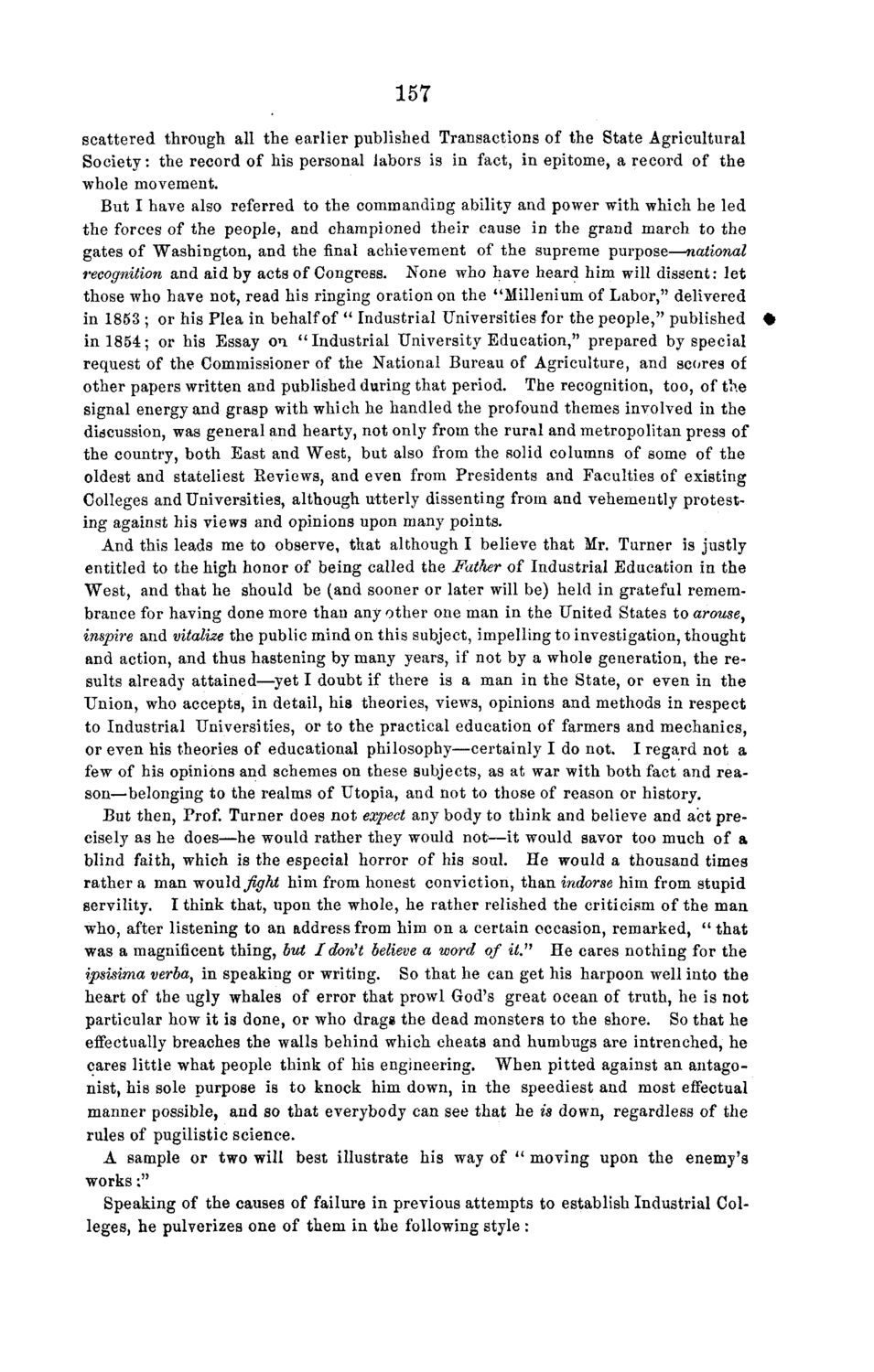| |
| |
Caption: Board of Trustees Minutes - 1868
This is a reduced-resolution page image for fast online browsing.

EXTRACTED TEXT FROM PAGE:
157 scattered through all the earlier published Transactions of the State Agricultural Society: the record of his personal labors is in fact, in epitome, a record of the whole movement. But I have also referred to the commanding ability and power with which he led the forces of the people, and championed their cause in the grand march to the gates of Washington, and the final achievement of the supreme purpose—national recognition and aid by acts of Congress. None who have heard him will dissent: let those who have not, read his ringing oration on the "Millenium of Labor," delivered in 1853 ; or his Plea in behalf of " Industrial Universities for the people," published • in 1854; or his Essay on "Industrial University Education," prepared by special request of the Commissioner of the National Bureau of Agriculture, and scores of other papers written and published during that period. The recognition, too, of the signal energy and grasp with which he handled the profound themes involved in the discussion, was general and hearty, not only from the rural and metropolitan press of the country, both East and West, but also from the solid columns of some of the oldest and stateliest Reviews, and even from Presidents and Faculties of existing Colleges and Universities, although utterly dissenting from and vehemently protesting against his views and opinions upon many points. And this leads me to observe, that although I believe that Mr. Turner is justly entitled to the high honor of being called the Father of Industrial Education in the West, and that he should be (and sooner or later will be) held in grateful remembrance for having done more than any other one man in the United States to arouse, inspire and vitalize the public mind on this subject, impelling to investigation, thought and action, and thus hastening by many years, if not by a whole generation, the results already attained—yet I doubt if there is a man in the State, or even in the Union, who accepts, in detail, his theories, views, opinions and methods in respect to Industrial Universities, or to the practical education of farmers and mechanics, or even his theories of educational philosophy—certainly I do not. I regard not a few of his opinions and schemes on these subjects, as at war with both fact and reason—belonging to the realms of Utopia, and not to those of reason or history. But then, Prof. Turner does not expect any body to think and believe and act precisely as he does—he would rather they would not—it would savor too much of a blind faith, which is the especial horror of his soul. He would a thousand times rather a man would fight him from honest conviction, than indorse him from stupid servility. I think that, upon the whole, he rather relished the criticism of the man who, after listening to an address from him on a certain occasion, remarked, " that was a magnificent thing, but I donH believe a word of it." He cares nothing for the ipsisima verbay in speaking or writing. So that he can get his harpoon well into the heart of the ugly whales of error that prowl God's great ocean of truth, he is not particular how it is done, or who drags the dead monsters to the shore. So that he effectually breaches the walls behind which cheats and humbugs are intrenched, he cares little what people think of his engineering. When pitted against an antagonist, his sole purpose is to knock him down, in the speediest and most effectual manner possible, and so that everybody can see that he is down, regardless of the rules of pugilistic science. A sample or two will best illustrate his way of " moving upon the enemy's works:" Speaking of the causes of failure in previous attempts to establish Industrial Colleges, he pulverizes one of them in the following style :
| |